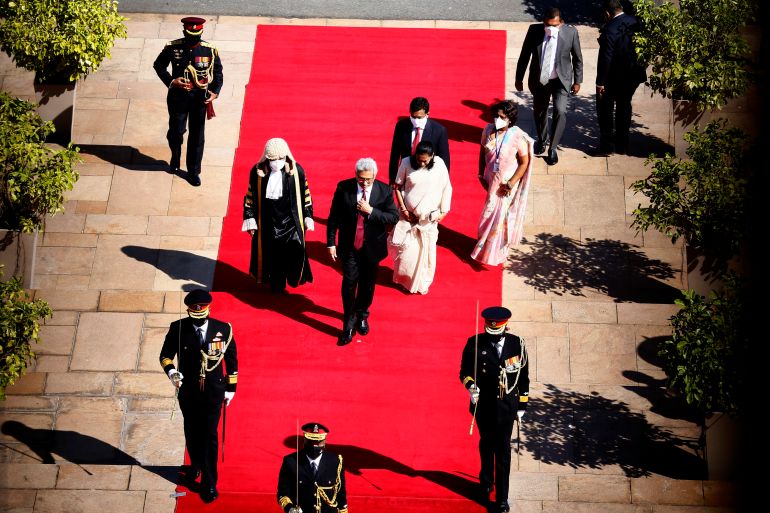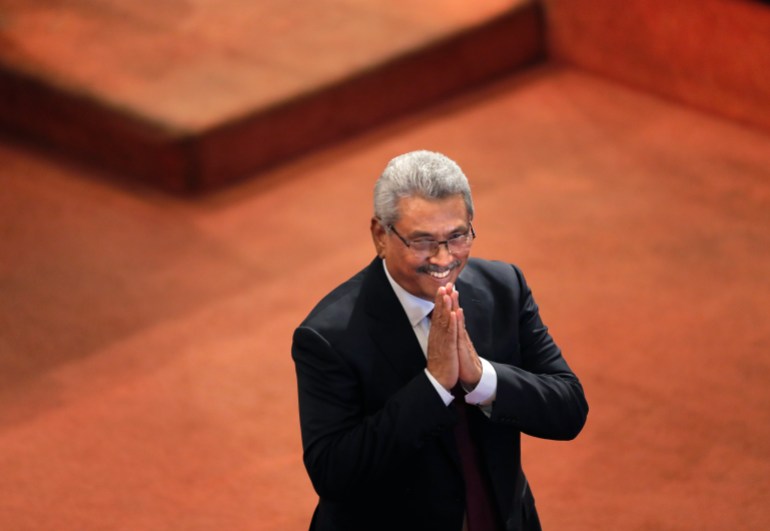Sri Lanka leader vows to fix ‘misconceptions’ over rights record
President Gotabaya Rajapaksa promises human rights reforms and ‘justice’ for missing people after years of resisting calls for such measures.

Sri Lanka’s president has promised to change “misconceptions” of his country’s human rights record, following years of international criticism over wartime atrocities and extrajudicial killings.
Government troops were accused of systematic abuses during the island’s decades-long separatist war against the Tamil Tigers group, including the killing of at least 40,000 civilians at the end of the conflict in 2009.
Keep reading
list of 4 itemsSri Lanka drops charges against ex-navy chief over 11 killings
Why Sri Lankan Tamil refugees in India attempted mass suicide
Sri Lanka: ‘One Country, One Law’
Sri Lanka has consistently denied the allegations. Since being elected president in 2019, Rajapaksa has sidestepped calls to investigate missing people from the civil war.
Families of victims allege that many of the missing were taken by the military for being involved with separatist rebels towards the end of the conflict.
Authorities have also been blamed for the murder of journalists and activists over the years, and there have been several recent reports of criminal suspects being killed in police custody.
But President Gotabaya Rajapaksa, who took office in 2019, said his government’s slate was clean and suggested it had been the victim of unwarranted criticism from abroad.
“We need to correct the misconceptions that have been taken to the international community in the past regarding our human rights,” Rajapaksa said during an address before a new session of parliament on Tuesday.
“During my tenure, the government did not support any form of human rights violations. We will also not leave room for any such act in the future.”

The Sri Lankan leader urged the country’s “politicians who still incite people against each other for political gains to refrain from doing so”.
“We reject racism. What this government wants is to equally protect the honour and rights of all citizens,” Rajapaksa said.
In earlier speeches, Rajapaksa has projected himself as a leader of the majority Buddhist Sinhalese and emphasised the fact that he was elected predominantly by their votes.
Since he was elected, several high-profile underworld figures have been shot dead in police custody, while other suspects have been detained for long periods without trial.
Rajapaksa was also the island’s top defence official at the end of the war, under the presidency of his elder brother Mahinda.
Sri Lanka was censured by the UN Human Rights Council for failing to properly investigate grave human rights abuses at the end of the conflict. The government’s refusal to address or investigate human rights and war crimes allegations from the civil war has been a source of tension in its relations with many Western countries and neighbouring India.
Last month, Rajapaksa appointed as provincial governor an ex-Navy chief accused of participating in the abduction and murder of nearly a dozen children, in a scheme to extort their wealthy families.
Economic crisis
Sri Lanka is currently in the grips of a slow-burning economic crisis that has triggered food rationing and rolling electricity cuts.
The island was hit hard by the COVID-19 pandemic, and the government has struggled to finance critical imports as a result of dwindling foreign exchange reserves.
India offered its neighbour a $500m loan to pay for urgent oil imports on Tuesday, after Sri Lanka’s energy ministry warned the island would run out of fuel by the end of the month.
India has 80 million ethnic Tamils itself and has looked to support the rights of minority Tamils in Sri Lanka.
Sri Lanka’s foreign reserves were about $1.6bn at the beginning of 2022, barely enough for a few weeks of imports. It also has foreign debt obligations exceeding $7bn this year.
The currency shortage has resulted in severe shortages of imported goods and long queues for milk powder, cooking gas, kerosene and other essentials.
Rajapaksa told parliament that the country needed to again attract tourists for the economy’s sake, but did not announce any new measures to address Sri Lanka’s predicament.